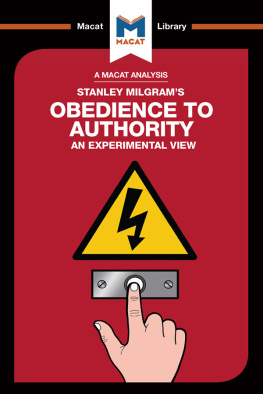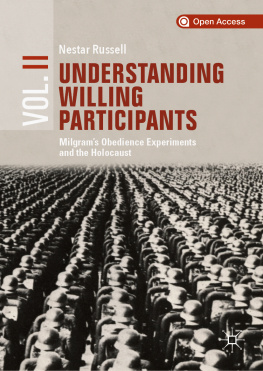OBEDIENCE TO AUTORITY
STANLEY MILGRAM
Stanley Milgrams experiments on obedience to malevolent authority seemed to me to be the most important social psychological research done in this generation.... The quality of exposition m the book is so high that it qualifies as literature as well as science: ROGER BROWN,
Harvard University
This well-designed and brilliantly executed research study, reported in an unusually fascinating and very readable style, reveals the elusive and sometimes shocking conditions under which men obey authority regardless of the morality involved.
Library Journal
..... one of the most significant books I have read in more than two
decades of reviewing.
ROBERT KIRSCH, Los Angeles Times
Milgrams experiment-based analysis is a model of systematic, sequential, patient
pursuit of answers to a significant social problem. His
investigations accomplish what we should expect of responsible social
science: to inform the intellect without trivializing the phenomenon
HENRY W. RIECKEN, Science
....a book that provides the most riveting and significant scientific reading thus far this year.... Milgrams book is carefully assembled and considered research, but past that it is also a streamlined and scientific metaphor for much of recent history. The resonance is deep, from Auschwitz to My Lai the connections unavoidable, the implications altogether cheerless.
- MICHAEL ROGERS, Rolling Stone
A major contribution to our knowledge of mans behavior. It establishes him firmly in the front rank of social scientists in this generation. JEROME S. BRUNER, Oxford University
OBEDIENCE TO AUTHORITY
STANLEY MILGRAM
Preface
Obedience, because of its very ubiquitousness, is easily overlooked as a subject of inquiry in social psychology. But without an appreciation of its role in shaping human action, a wide range of significant behavior cannot be understood. For an act carried out under command is, psychologically, of a profoundly different character than action that is spontaneous.
The person who, with inner conviction, loathes stealing, killing, and assault may find himself performing these acts with relative ease when commanded by authority. Behavior that is unthinkable in an individual who is acting on his own may be. executed without hesitation when carried out under orders.
The dilemma inherent in obedience to authority is ancient, as old as the story of Abraham. What the present study does is to give the dilemma contemporary form by treating it as subject matter for experimental inquiry, and with the aim of understanding rather than judging it from a moral standpoint.
The important task, from the standpoint of a psychological study of obedience, is to be able to take conceptions of authority and translate them into personal experience. It is one thing to talk in abstract terms about the respective rights of the individual and of authority; it is quite another to examine a moral choice in a real situation. We all know about the philosophic problems of freedom and authority. But in every case where the problem is not merely academic there is a real person who must obey or disobey authority, a concrete instance when the act of defiance occurs. All musing prior to this moment is mere speculation, and all acts of disobedience are characterized by such a moment of decisive action. The experiments are built around this notion.
When we move to the laboratory, the problem narrows: if an experimenter tells a subject to act with increasing severity against another person, under what conditions will the subject comply, and under what conditions will he disobey? The laboratory problem is vivid, intense, and real. It is not something apart from life, but carries to an extreme and very logical conclusion certain trends inherent in the ordinary functioning of the social world.
The question arises as to whether there is any connection between what we have studied in the laboratory and the forms of obedience we so deplored in the Nazi epoch. The differences in the two situations are, of course, enormous, yet the difference in scale, numbers, and political context may turn out to be relatively unimportant as long as certain essential features are retained. The essence of obedience consists in the fact that a person comes to view himself as the instrument for carrying out another persons wishes, and he therefore no longer regards himself as responsible for his actions. Once this critical shift of viewpoint has occurred in the person, all of the essential features of obedience follow. The adjustment of thought, the freedom to engage in cruel behavior, and the types of justification experienced by the person are essentially similar whether they occur in a psychological laboratory or
the control room of an ICBM site. The question of generality, therefore, is not resolved by enumerating all the manifest differences between the psychological laboratory and other situations but by carefully constructing a situation that captures the essence of obedience-that is, a situation in which a person gives himself over to authority and no longer views him- self as the efficient cause of his own actions.
To the degree that an attitude of willingness and the absence of compulsion is present, obedience is colored by a cooperative mood; to the degree that the threat of force or punishment against the person is intimated, obedience is compelled by fear. Our studies deal only with obedience that is willingly assumed in the absence of threat of any sort, obedience that is maintained through the simple assertion by authority that it has the right to exercise control over the person. Whatever force authority exercises in this study is based on powers that the subject in some manner ascribes to it and not on any objective threat -or availability of physical means of controlling the subject.
The major problem for the subject is to recapture control of his own regnant processes once he has committed them to the purposes of the experimenter. The difficulty this entails represents the poignant and in some degree tragic element in the situation under study, for nothing is bleaker than the sight of a person striving yet not fully able to control his own behavior in a situation of consequence to him.
Acknowledgments
The experiments described here emerge from a seventy-five- year tradition of experimentation in social psychology. Boris Sidis carried Out an experiment on obedience in 1898, and the studies of Asch, Lewin, Sherif, Frank, Block, Cartwright, French, Raven, Luchins, Lippitt, and White, among many others, have informed my work even when they are not specifically discussed. The contributions of Adorno and associates and of Arendt, Fromm, and Weber are part of the zeitgeist in which social scientists grow up. Three works have especially interested me. The first is the in- sightful Authority and Delinquency in the Modern State, by Alex Comfort; a lucid conceptual analysis of authority was written by Robert Bierstedt; and Arthur Koestlers The Ghost in the Ma- chine developed the idea of social hierarchy in ~eater depth than the present book.
The experimental research was carried out and completed while I was in the Department of Psychology at Yale University, 1962-63. And I am grateful to the department for helping me with research facilities and good advice. In particular I would like to thank Professor Irving L. Janis.
The late James McDonough of West Haven, Connecticut, played the part of the learner, and the study benefited from his unerring natural talents. John Williams of Southbury, Connecticut, served as experimenter and performed an exacting role with precision. My thanks also to Alan Elms, Jon Wayland, Taketo Muata, Emil Elges, James Miller, and J. Michael Boss for work done in connection with the research.
Next page









